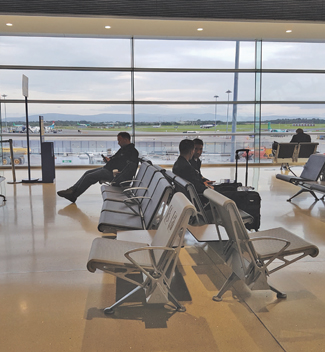Ahead of the Security Industry Authority’s skills summit in London on March 12, we preview the event and range over directions that private security skills are going, and where they could go – with or without the stamp of the UK private security regulator. First, behavioural detection training.
The young Asian man looks nervous. He’s been hanging around the airport for a while, going up and down escalators; not settling. Is he a terrorist doing hostile reconnaissance, or even plucking up the nerve to carry out an attack? An eastern European woman is carrying a bag of money – is she a money launderer? These are two of the five scenarios, or rather five people’s stories, in a training video by Crisis Cast, with Andrew Palmer, who’s talked about Gatwick Airport’s use of BDO-trained security officers to various industry events, such as IFSEC 2018, as featured in the October 2018 print issue of Professional Security magazine.
Some of behavioural detection may sound simple and obvious; if you see someone behaving suspiciously, you engage them in conversation. How are they? and what brings them here? It may turn out that the person has an innocent explanation – including for nervous or out of the ordinary acts. Of those five stores in the training video, it would be giving the game away to say which of the five is the terrorist; enough to say that you cannot entirely judge on appearances.
It’s less simple and obvious, because to know what is out of the ordinary you have to know the ordinary; in other words, you have to understand the site you are securing or patrolling. And you have to know who to report to, and in good time, if you do come upon someone or something suspicious, that cannot give a reasonable or any explanation; to keep yourself and others safe.
BDO – the observing of behaviour and homing in on what’s suspicious – has the advantage of looking like customer service to the innocent; to the security patroller, it adds to their understanding of their job, and by making it more interesting may serve to retain staff; and to the person who is suspicious, it piles on psychological pressure, as in the police patrol method, Project Servator.
The BDO video is in line with Crisis Cast’s stock in trade of crisis management and emergency response training, as story-based. For as with any training – in physical intervention, by a doorman; a fireman cutting someone free from a car after a road accident – it’s one thing to be shown what to do, quite another to do it promptly enough and under pressure – whether flames and sirens, or baying night-clubbers or pub-goers.
MD of Crisis Cast Brian Mitchell has a film and theatre background rather than training and emergency management, hence his use of actors – who play the parts of characters in a story. Professional Security magazine well remembers one example in London in 2014.
Brian told an audience that the room was being locked down because of an incident in the entrance lobby. We sat there but one man got up and became ever more agitated; he had to leave the room, he had someone out there that might be in danger that he had to reach. It was utterly convincing and how was the person in charge of the lock-down going to talk the man out of his upset and urge to head for the danger? Brian stopped the performance and the actor stopped in an instant; it was a remarkable example of acting, as moving as the scene at the end of the film The Usual Suspects when Kevin Spacey turns suddenly from a nobody into the criminal mastermind Kaiser Soyze. The piece of acting was thanks to – as Brian can explain, and he spoke most recently to the International Security Expo at London Olympia in December 2019 – the actor being steeped in the story, and understanding the psychology physiology of how a man in distress may feel, or in pain when trapped in a car, or when he has a knife pressed to his throat in an armed robbery. Or, if you are a security officer in a mall, what do you feel when you see a knife pressed to the throat of a shopper? You may think you will feel and respond in one way; when acting out the drama, your response may be another.
Hence Crisis Cast offer training in policing a riot or protest, or rescuing passengers from a jet that’s made an emergency landing; or in the corporate office, how to handle such a crisis in terms of media management, and social media.
Picture by Mark Rowe; Dublin Airport passenger lounge, September evening.
Next: sector-specific skills.










